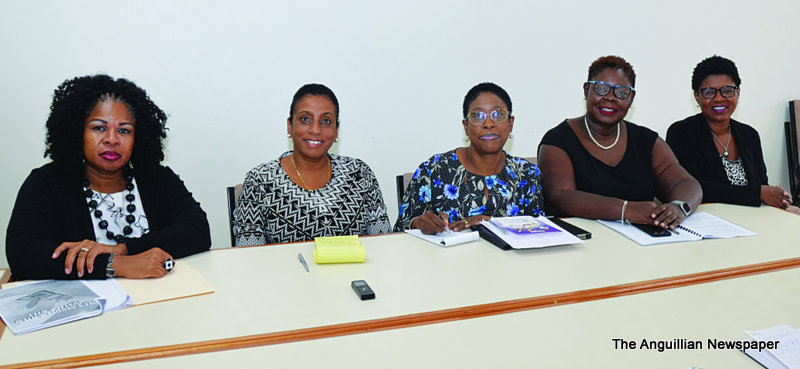
Ms. Heather Stewart, Ms. Joycelyn Johnson and Mrs. Kiesha
Gumbs-Bibby
On Wednesday, February 12th a press conference was held to acquaint the public on work being done to draft a Child Justice Bill. It is to make the court system more manageable for family matters and, in particular, for children considered as minors, who would commit criminal and civil offences.
The main speaker at the conference was Ms. Jacqueline Sealy Burke, Legal Consultant. She was accompanied by Ms. Heather Stewart, a UNICEF Child Protection Specialist. Both officials were introduced by Dr. Bonnie Richardson-Lake, Permanent Secretary in the Ministry of Social Development.
Mrs. Stewart deliberated on plans for the enacting of the new legislation: “Currently we are adopting the OECS Model Bill for the Anguillian context as far as the Child Justice Bill is concerned.” She stated, “Since 2003, we have been working at this process to get OECS member states and Associate Members to reform their justice systems for children in line with the provisions of the Convention on the Rights of the Child and other international minimum standards.
“We are pleased that Anguilla has reached this stage in drafting the Child Justice Bill. It provides for setting the minimum age of responsibility for children, an age under which a child is presumed not to have the capacity to infringe on criminal law. However, we must ensure that if a child should, per chance, commit an offense under the minimum age, that there are other systems in place to manage that presented behaviour so that no one gets away scot free.”
In relating the fact that this bill is being considered across the region, Ms. Stewart continued: “We are living in a region where there is freer movement of people. Under such conditions, the OECS states and member states can harmonize certain social provisions on these Child Justice Bills. All of the OECS countries are working at the uniformity of this legislation.”
She went on: “As the watchdog for the UN system, on the obligations for children, we want to ensure that this region is becoming more and more compliant. Discussions are ongoing to raise the minimum age of criminal responsibility higher than age twelve. We want this region to be the most child-friendly place — a place where all these services can converge around children who are facing challenges to make the best of their potential.”
Ms. Jacqueline Burke remarked: “I have been in Anguilla prior, getting the ground ready for the implementation of the Child Justice Bill. It is one thing to pass a bill and make it into law, but all systems must be in place to effectively and efficiently implement that new law.”
She continued: “I have been offering assistance all across the region, and I am glad to be here in Anguilla to offer assistance with this bill. I was here working on the implementation of the Domestic Violence Bill in 2015. Now I welcome the opportunity and congratulate the government in taking the proactive step to consult with the public and service providers on this Child Justice Bill because it is so important that the public is knowledgeable about this pending law.”
Ms. Burke focused on the fact that although the bill seeks to be as lenient as possible to youngsters who do not have the capacity as adults, the element of accountability cannot be overlooked. In that respect, she emphasized: “The important take away from this legislation is that it is about ensuring that we blend accountability with child friendliness. As much as we want to ensure that this law meets the needs and best interest of children, and while we recognize that children who commit crime cannot be treated as adults, we cannot let go of the accountability.”
Meanwhile, Permanent Secretary, Bonnie Richardson-Lake noted that a general consultation meeting was been held on Wednesday evening, February 12th, for the public to share its views on the bill.
– Staff Reporter, James R. Harrigan







